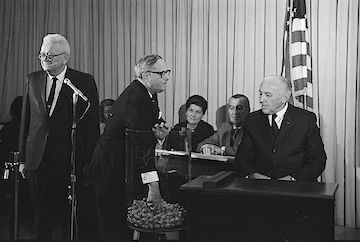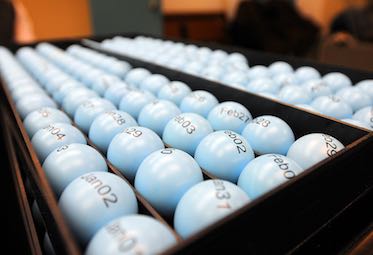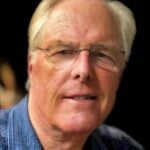Draft Lottery

First selection for the draft, Dec. 1, 1969.
After more than a year of waiting and writing freelance articles for the Datebook, city editor Abe Mellinkoff finally relented and gave me a tryout as a reporter in late November 1969. “You’re on Christmas break from school, right?” he asked me. “OK, I’ll give you three weeks to see what you can do. But it’s only three weeks, and then you’ll go back to copy boy.”
It was highly unusual for a copy boy to be promoted without paying dues at a smaller paper in an outlying region. Only a few had done it before me, and most of them had at least finished college. But Abe had a sense about me, he said, and the work I’d done for Datebook showed him I had some rudimentary skills.
I showed up for my first official day as a reporter at 9:30 a.m. on Monday, December 1, 1969. One of my best mentors and advocates at the paper was assignment editor Dick Hemp. “Duffy,” he called to me as I was filling out some paperwork for the accounting department. “I have an assignment for you. It’s about the draft lottery.” In Washington D.C. that morning, the Selective Service was conducting the lottery of birth dates to determine the order that men born from 1944 to 1950 would be called to military service in the Vietnam War.
“The first birth date drawn was September 14,” said Hemp. “I want you to find a local kid with that birthday in 1950 and go talk to him, find out what he thinks about it, will he go or not, all that.”
At that time, the Chronicle printed the daily birth records of every child in the Bay Area, so I went back to the newspaper library and pulled out the birth announcements from September 14, 1950. There were about eight or nine Bay Area boys in the clipping, which listed their names, their parents’ names and their home towns. Using a reverse phone directory, I started calling people on the list. I struck out with the first four or five, who had either moved and changed phone numbers or didn’t answer. Finally, I reached the parents of Mike Boland in San Mateo.
“Mike’s a student at USF,” his mother told me, and gave me the name of his dorm, Phelan Hall. Hemp assigned a photographer to go with me and off we went to find Boland. Quite a scene greeted us at his dorm. Dozens of young men were gathered in a large day room, watching the draft lottery live on television. They had posted a big poster board on one wall, where they wrote down each number as it was pulled from the drum. Every new number was greeted with an equal number of groans and cheers from the boys.
I found Boland in his dorm room and we sat down to talk. I returned to the paper and wrote it up. The next morning, I opened the paper and found my article displayed across three columns on page 11, with photos of Boland and the packed day room with its chart. I was shocked to see my byline at the top. This was unheard of for a reporter on his or her first day. Some veteran reporters had waited months for their first byline. I heard later through the grapevine that a number of them were angry about this, but no one ever said anything to me directly.
Here’s my story:

Lottery balls used for the draft.
Mike Boland is the kind of person who likes to put things off until the last minute.
Now he may have to change his habits because, if for no other reason, he was born on Sept. 14, 1950, the first date drawn in last night’s draft lottery.
“I hadn’t given it much thought before,” he said in his dormitory room at the University of San Francisco shortly after the announcement. “But since I heard I’ve been doing some pretty fast thinking about what I’m going to do now.”
A history major in his sophomore year, Boland said his younger brother telephoned to tell him the news.
“I wasn’t too concerned,” he said. “I’ve been strolling along with a H-S (student) deferment but now the pressure is really on me. I guess I’ll look into the reserve possibility — I don’t really know. I think my mother’s taking it pretty hard.
“I always put things off, like a paper I have to do, I’ll wait until the last day. Now I’ll have to make more definite plans.”
Boland was born on that now-so-important date at Children’s Hospital in San Francisco and is registered as number 4-57-50-1578 with Local Board 57 in San Mateo, where his parents, Mr. and Mrs. Thomas F. Boland, reside.
A tall, slim youth with collar-length brown hair and brown eyes, Boland apparently has resigned himself to the fact that his chances of being called are stronger than most.
“At least Mike knows for sure,” said his roommate, Shelton Bunn, 20. I’m in the middle and still don’t know one way or the other.” Bunn’s birthday is November 15, the 131st date drawn.
Meanwhile, four floors above Boland’s room, a crowd of students gathered around a posted list of the numbers. Occasionally a yelp of “Hey, I’m way down at the bottom!” could be heard above the chatter.
Another youthful student with short, blond hair found his birthdate to be No. 75. How did he feel about it? “I sure could use a beer,” he said somewhat dejectedly.
John Shovein, a 21-year-old history major whose birthday is June 20, No. 380 on the list, was noticeably relieved. “I’m a senior so I probably won’t be called,” he said. “It’s a great feeling!”
A common belief among most of the students in Phelan Hall, the only men’s dorm on campus, is that by the time their student deferments are invalid — in most cases, two years from now — the war will be over. “I figure the war will be over anyway by the time they get to me,” said Laurie Fedora, an 18-year-old English major, “so I really wouldn’t mind going. But it’d be nice to know for sure I wasn’t going to Vietnam!”
A hand-printed sign on a piece of binder paper alongside the lottery results read: “To defray the cost of the Canadian flight, please stick a dime under the door.”
“We raised $2.34,” said Ken Canfield, 21, a senior. “But I don’t care, I’m getting married next month and my birthday is June 14, number 356.”
 AUTHOR
AUTHOR